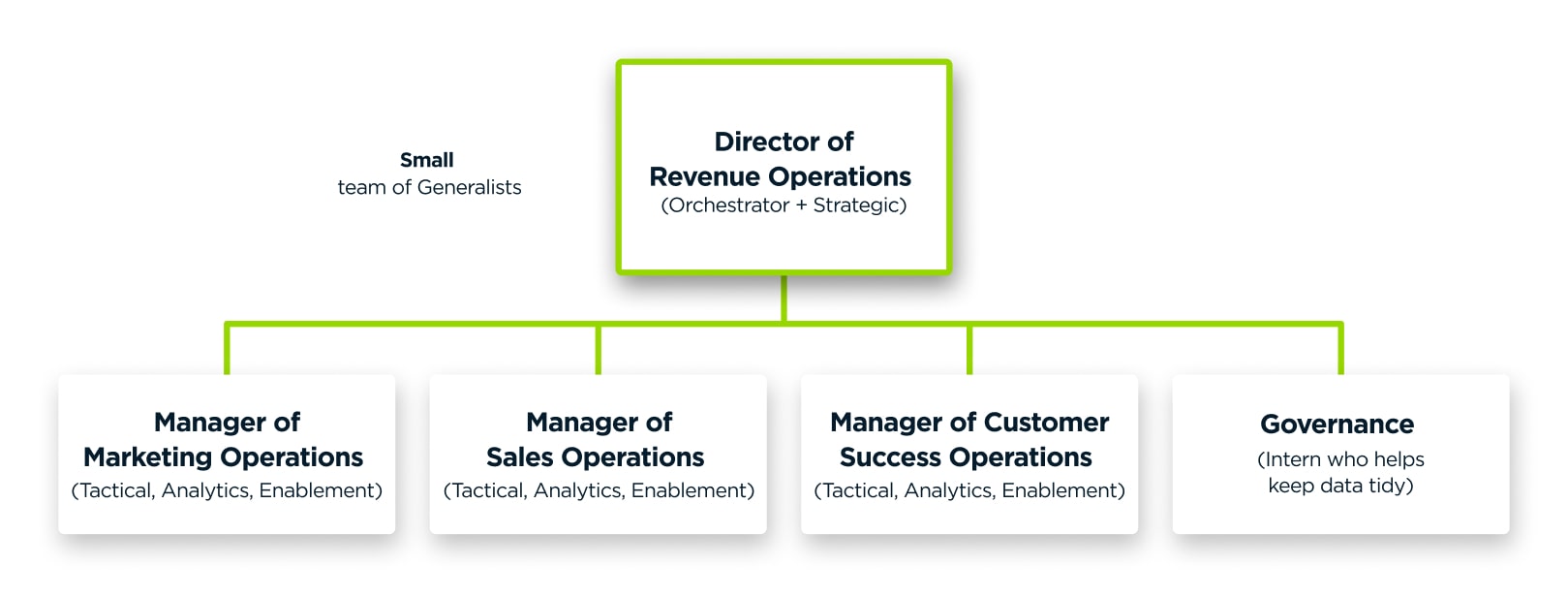As a Managing Director, metrics matter to you. Accuracy and reliability are non-negotiable.
ARR Scale | YOY Revenue Growth | LTV/CAC | ASP | TAM | Gross Customer Retention Gross Margin |
Rule of 40
Above have been considered some of the most important topline metrics that Managing Directors focus on to drive growth.
Ask yourself these two questions that represent two sides of the same coin:
- How often do you need these data points to make informed decisions?
- How often do you lack confidence in these data points?
Envision total trust in these data points. Gaining that trust hinges on a solid Revenue Operations team.
In this blog we will explore the benefits of a revenue operations team, what roles are essential to the team, and how to best monitor their effectiveness.
The effectiveness of your Revenue Operations (RevOps) team within a portfolio company is best gauged by the accuracy of the data they collect.
Accurate metrics, such as Annual Recurring Revenue (ARR) Scale, Year-Over-Year (YOY) Revenue Growth, and the Lifetime Value to Customer Acquisition Cost (LTV/CAC) ratio are crucial.
You should be able to rely on your Customer Relationship Management (CRM) or Data Analytics systems to provide this information. Conversely, if essential metrics are missing or inaccurate, it reflects poorly on your RevOps team’s performance.
If you’re operating without a RevOps team, it’s worth considering the establishment of one.
The advantages of a dedicated RevOps team are significant. This department is essential for ensuring data is trustworthy and reliable. The reason is that RevOps, by its very nature, is centralized data governance. The RevOps team manages all data—its inflow, outflow, and inter-departmental exchanges.
Traditionally, departments like Marketing, Sales, and Customer Support focus on their own specific metrics. This leads to fragmented data, inconsistencies, and a lack of comprehensive insight. Instead of a piecemeal understanding, a holistic perspective is necessary for strategic decision-making.
In a well-structured RevOps team, you would typically find a Director of RevOps overseeing specialized roles. These roles include such roles as Marketing Operations, Sales Operations, and Customer Support (CS) Operations. Each team member, an expert in their field, works together to ensure seamless data integration across departments. The Director of RevOps acts like an orchestra conductor, ensuring harmonious movement of people and data.
The size of your company may determine the most effective way to structure for your RevOps team. Here, I will focus on how to best STAGE your RevOps team to ensure you are collecting the most reliable data possible.
What exactly does “STAGE” refer to?
“STAGE” is an acronym representing five key components: Strategic, Tactical, Analytics, Governance, and Enablement.
Each role is crucial for a high-performing RevOps team. The structure of the team and the distribution of these roles can vary depending on its size. In smaller teams, it’s common for one or two individuals to manage multiple areas. Whereas in larger teams, there might be dedicated specialists for each role.
Let’s dive deeper:
Strategic Role: This individual is dedicated to improving processes, adopting new technologies, territory planning, and devising commission strategies. They spearhead strategic initiatives to boost sales efficiency and prioritize a backlog effectively.
Technical Role: This hands-on position ensures that the systems in use are user-friendly and that data flows without interruption. Collaborating closely with the strategic role, this team member is responsible for the technical development required for peak efficiency.
Analytics Role: The analytics role is versatile. It may involve monitoring the CRM data inputs to identify any potential issues or red flags. This specialist scrutinizes dashboards and reports, maintaining their accuracy and reliability.
Governance Role: Acting as the data steward, this person guarantees that the data remains clean, pertinent, and current. This directly enhances the reliability and accuracy of reports. Their duties encompass purging obsolete leads, refining data, and upholding process compliance. While this can be part of someone’s job, it also presents an excellent opportunity for an intern.
Enablement Role: This role is crucial in training the team on the effective use of technology and data entry practices. By equipping the team with the necessary skills, this person is integral to the consistent and accurate capture of data for dependable reporting.
For example, a large team of specialists could look something like this:
If you have a much smaller team, it may look something like this:
What you might notice is that specific titles are not assigned to each aspect of STAGE. Rather, the emphasis is placed on the core functions of their roles within their respective areas of expertise.
The essence here is that every role is vital for ensuring data accuracy and reliability.
Now is a good opportunity to evaluate your portfolio companies. Ask yourself whether the data is precise and dependable. Consider if your team is structured appropriately under the STAGE framework to capture the necessary data points for making informed decisions with confidence. Your path to double-digit growth depends on a strong RevOps function. Feel free to reach out if you need assistance in assessing and optimizing your team’s structure to ensure it’s correctly STAGEd.





